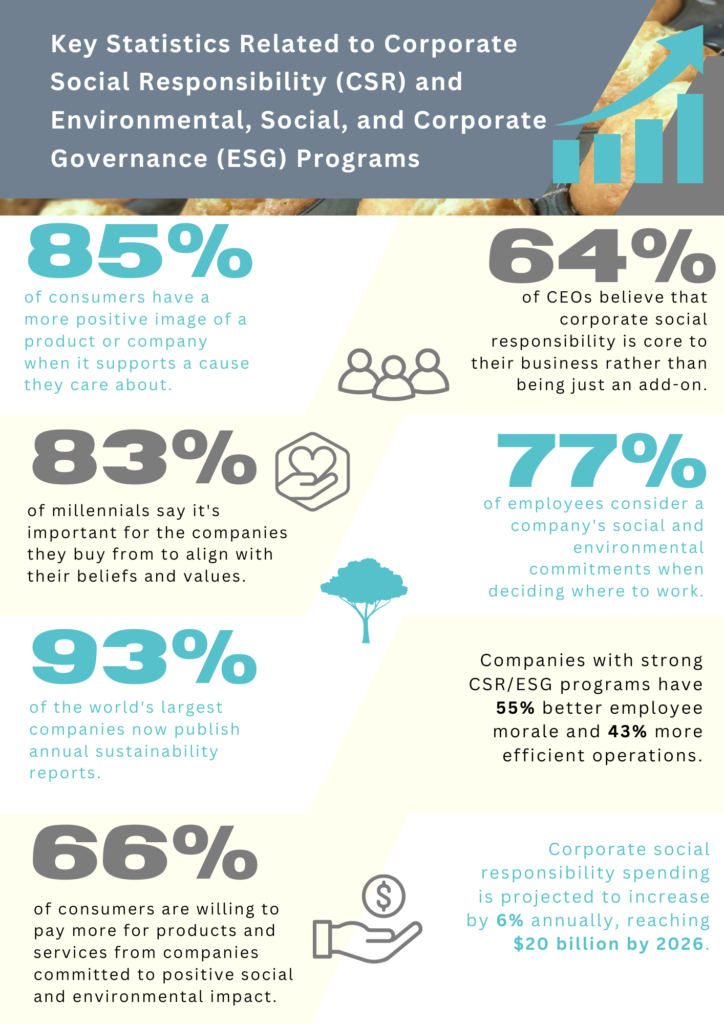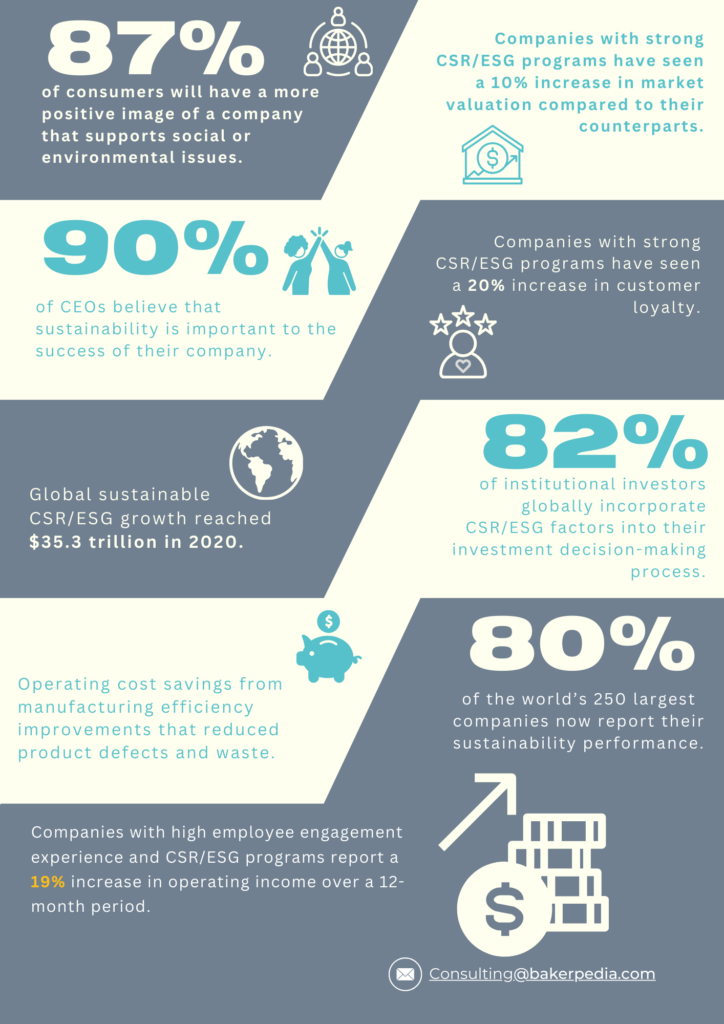Environmental, Social and Governance (ESG)

ESG serves as a framework for assessing a company’s sustainability and ethical footprint. Its integration into the workplace is appealing because it fosters environments where individuals flourish and businesses prosper, driven by companies and managers committed to ESG principles. Corporate Social Responsibility (CSR) encompasses a company’s values, policies, and procedures and their influence on global social, economic, and environmental dynamics. Ideally, it represents a self-regulating business model enabling a company to uphold social accountability to itself, its stakeholders, and the broader public.
Why is CSR or ESG Important?
What do we do?
CSR / ESG programs require careful planning and execution to ensure it aligns with the company’s values, goals, and resources while making a positive impact on society and the environment. These are steps for building a robust CSR/ESG program. They cover a range of critical elements that help ensure a company’s CSR/ESG efforts are meaningful, impactful, and sustainable. Here’s a summary:
- Define Your CSR/ESG Objectives
- Clarify your compan’s CSR/ESG mission, focusing on the values and goals that align with your business model.
- Identify specific issues where your company can make a meaningful impact.
- Conduct a Stakeholder Analysis
- Identify your key stakeholders: employees, customers, suppliers, investors, communities, etc.
- Understand their interests and expectations around CSR/ESG to guide your program’s focus.
- Allocate Financial Resources
- Establish a budget for CSR/ESG initiatives, ensuring it aligns with your company’s financial capacity and goals.
- Consider how to balance financial objectives with social and environmental commitments.
- Assemble an CSR/ESG Team
- Create a cross-functional team with representatives from various departments (HR, marketing, operations, finance).
- Benchmark your strategy against best practices from other socially responsible companies to guide your efforts.
- Identify Significant CSR/ESG Issues
- Conduct a materiality assessment to determine which social, environmental, and economic issues are most relevant to your business and stakeholders.
- Focus on areas where your company can have the most significant impact.
- Embed CSR/ESG into Business Operations
- Ensure CSR/ESG principles are integrated into company policies, procedures, and day-to-day operations.
- Align CSR/ESG with overall business strategy for coherence and effectiveness.
- Foster a Culture of Corporate Citizenship
- Engage employees in CSR/ESG activities, such as volunteering, awareness campaigns, and skill-based projects.
- Encourage a sense of ownership and commitment to social and environmental responsibility within the organization.
- Collaborate with External Partners
- Form strategic partnerships with nonprofits, government agencies, academia, and other businesses.
- Collaboration can expand your reach and impact, providing diverse resources and expertise.
- Establish Key Performance Indicators (KPIs)
- Define KPIs to measure CSR/ESG performance, with a focus on quantitative and qualitative metrics.
- Implement a feedback loop to refine and improve your CSR/ESG initiatives over time.
- Communicate Transparently
- Share your CSR/ESG efforts, progress, and outcomes with stakeholders through various communication channels (e.g., website, social media, annual reports).
- Transparency fosters trust and enhances stakeholder engagement.
- Solicit Stakeholder Feedback
- Regularly seek feedback on your CSR/ESG initiatives to gauge stakeholder satisfaction and identify areas for improvement.
- Use this feedback to adapt and refine your strategy to better meet stakeholder needs.
- Recognize and Celebrate Achievements
- Highlight milestones, success stories, and team achievements to maintain momentum and encourage engagement.
- Recognition fosters a positive culture and motivates employees to continue contributing to CSR/ESG efforts.
- Continuously Improve and Innovate
- CSR/ESG is a continuous journey; stay informed about emerging trends and challenges.
- Continuously refine your strategy to stay relevant and impactful in a changing environment.
By following these steps, you can build a comprehensive and impactful CSR/ESG program that aligns with your company’s values and contributes positively to society and the environment.

KPI – Key Performance Indicators
What is the difference between CSR and ESG?
They are related concepts, but they differ in terms of focus, scope, approach, and measurement. Here’s a breakdown of the key differences between CSR and ESG:
Corporate Social Responsibility (CSR):
- Definition: CSR is a business approach that involves initiatives and practices aimed at contributing to sustainable development by delivering economic, social, and environmental benefits to stakeholders and society at large.
- Focus: CSR generally has a broader focus on social responsibility, community involvement, environmental stewardship, and philanthropy.
- Approach: CSR is often viewed as a voluntary, self-regulatory effort by companies to act ethically and responsibly. It emphasizes “giving back” to society and may include activities like charity, volunteerism, and community outreach.
- Measurement: CSR programs can be less formal in terms of measurement, with varying levels of rigor. Impact assessment and quantification may not be as strict or standardized.
- Integration: CSR initiatives can sometimes be standalone or peripheral to a company’s core business operations, with less emphasis on formal integration into business strategy.
Environmental, Social, and Governance (ESG):
- Definition: ESG is a framework used by investors and other stakeholders to evaluate a company’s performance in three specific areas: Environmental, Social, and Governance. It is a comprehensive set of criteria used to assess a company’s sustainability and ethical impact.
- Focus: ESG focuses on specific, measurable factors related to a company’s environmental impact, social practices, and governance structure. It is data-driven and intended for use in investment analysis and decision-making.
- Approach: ESG emphasizes quantitative and qualitative metrics that can be tracked, reported, and benchmarked. It is used to assess risks, opportunities, and the long-term sustainability of a company’s business practices.
- Measurement: ESG relies on established standards, metrics, and frameworks to measure performance. Companies may be required to report ESG data to meet investor and regulatory expectations.
- Integration: ESG principles are typically integrated into business operations and strategy, with a stronger connection to financial performance, risk management, and investor expectations.
In Summary:
- CSR focuses on a company’s broader sense of responsibility to society and the environment, often emphasizing voluntary actions and community engagement. It is typically more flexible and less driven by external reporting requirements.
- ESG, on the other hand, is a more structured framework that focuses on measurable environmental, social, and governance factors, with a strong emphasis on reporting, accountability, and integration into business strategy. It is used by investors and stakeholders to evaluate and compare companies’ sustainability and ethical practices.
In essence, CSR often involves ethical and philanthropic initiatives, while ESG focuses on formal criteria and metrics used to evaluate a company’s sustainability and governance for investment and risk assessment.
About Mark Grimes:
 Mark Grimes is a startup founder who has started each of his eight businesses since 1989 with no outside investment capital, no business plan and all have been profitable within 90 days or less. Past founder of eyescream interactive an advertising agency with clients such as P&G, Nextel, Disney, and Outpost.com. The agency was one of the top 20 interactive advertising agencies in the world according to Adweek magazine. His other past startups have included NedSpace, Maker Faire Africa, Pitch Black and Startup Radio Network. Mark advises startup founders helping them develop their business models and has supported over 8,700 women entrepreneurs in developing countries since 2006.
Mark Grimes is a startup founder who has started each of his eight businesses since 1989 with no outside investment capital, no business plan and all have been profitable within 90 days or less. Past founder of eyescream interactive an advertising agency with clients such as P&G, Nextel, Disney, and Outpost.com. The agency was one of the top 20 interactive advertising agencies in the world according to Adweek magazine. His other past startups have included NedSpace, Maker Faire Africa, Pitch Black and Startup Radio Network. Mark advises startup founders helping them develop their business models and has supported over 8,700 women entrepreneurs in developing countries since 2006.
About Dr. Lin Carson:
 Dr. Carson’s journey in the baking world includes notable ventures with brands like Wendy’s Int’l and Dave’s Killer Bread. The Founder of BAKERpedia, she now dedicates her efforts to help bakers worldwide optimize their quality processes, reducing waste and maximizing efficiency. She believes that bakeries who are doing parts and parcels of social giving and corporate responsibility, are probably not documenting it well enough. Dr. Carson believes CSR/ESG will change this. When implemented, the future of baking will fundamentally be driven by CSR/ESG principles.
Dr. Carson’s journey in the baking world includes notable ventures with brands like Wendy’s Int’l and Dave’s Killer Bread. The Founder of BAKERpedia, she now dedicates her efforts to help bakers worldwide optimize their quality processes, reducing waste and maximizing efficiency. She believes that bakeries who are doing parts and parcels of social giving and corporate responsibility, are probably not documenting it well enough. Dr. Carson believes CSR/ESG will change this. When implemented, the future of baking will fundamentally be driven by CSR/ESG principles.



